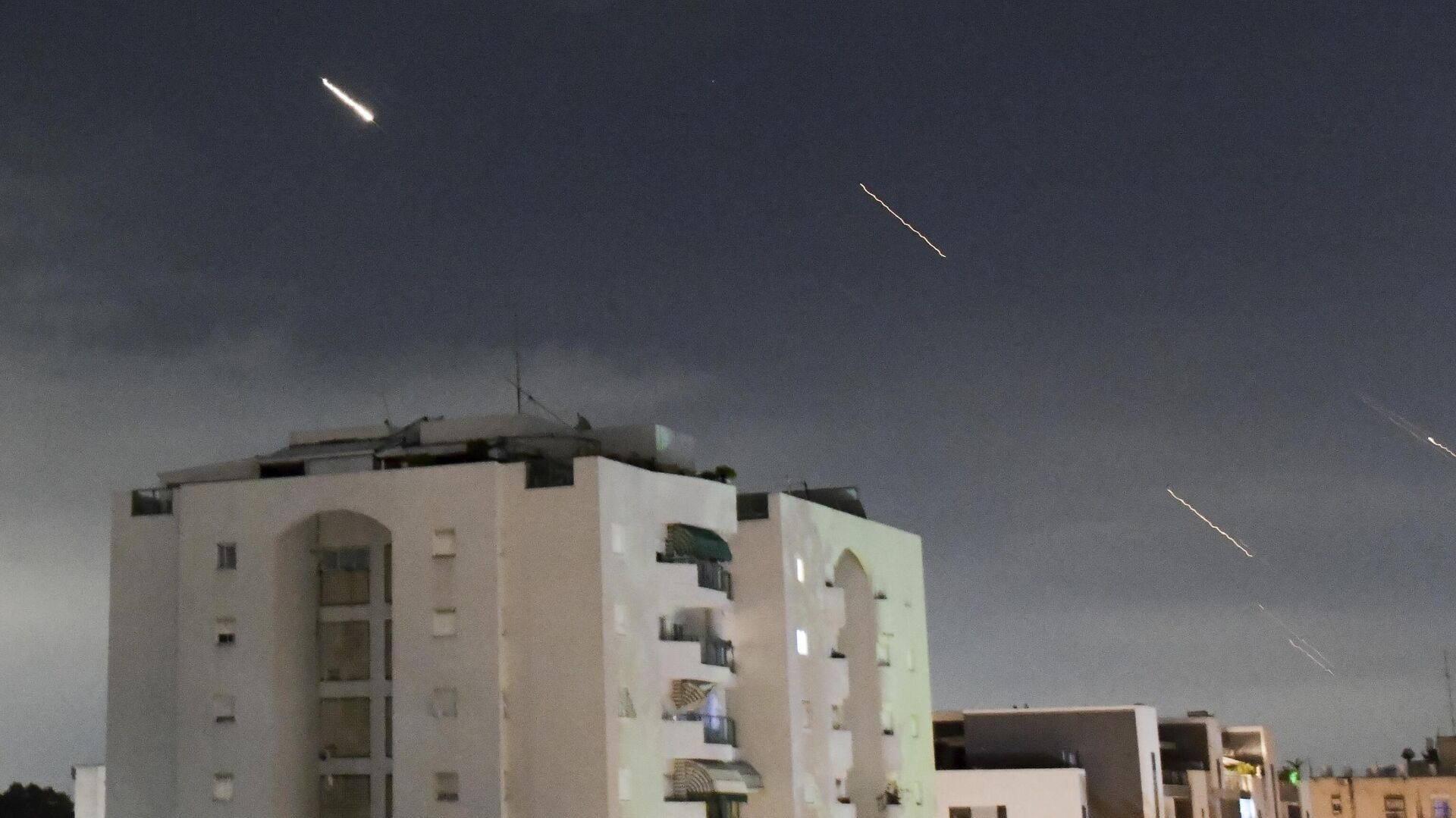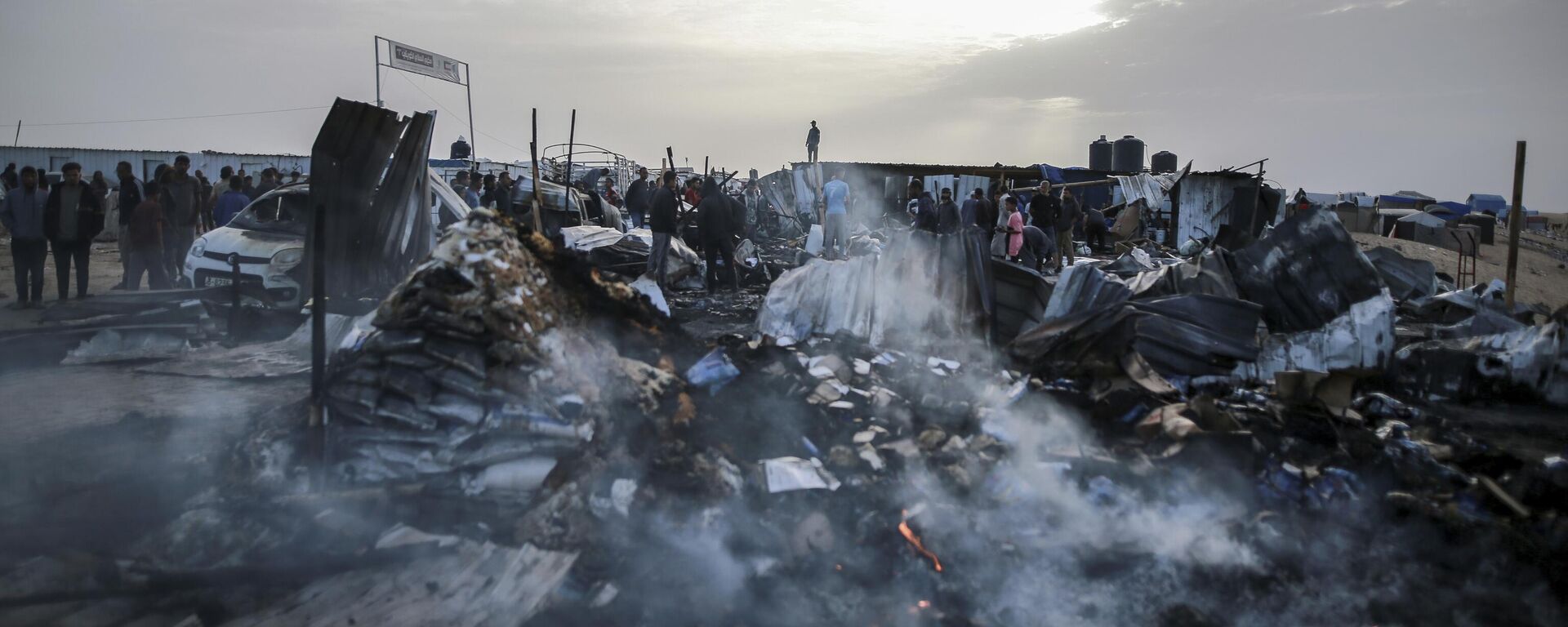ln Choosing Sides, US Says 'Embassies Are Fair Game'
00:05 GMT 14.08.2024 (Updated: 06:01 GMT 14.08.2024)

© AP Photo / Tomer Neuberg
Subscribe
Israel, which is currently waging a war in the Gaza Strip that has killed tens of thousands since October, has provoked Iran with attacks in April as well as recently. Iran has said it plans to retaliate as the US continues to stock Israel with military arms.
Fears of a regional war in the Middle East have been growing since the assassination of Hamas political leader Ismail Haniyeh, who was killed in an attack on his residence in Tehran. Just hours prior, Israel also struck south Beirut and killed Hezbollah commander Fuad Shukr. Hamas and Iran have blamed Israel for the assassination and have vowed retaliation.
Mohammad Marandi, a professor of English literature and Orientalism at the University of Tehran, joined Sputnik’s Fault Lines on Tuesday to discuss the tension in the Middle East, and how the West has been playing a role in that tension by fortifying their support for Israel.
“The Israelis, when they bombed the Iranian consulate in Damascus, killing 12 people, the expectation, of course, for the international community was universal condemnation. But when Iran took its complaint to the UN Security Council, the US, France, and Britain supported - and so did the Germans, supported the Israeli regime. So, the message that the West was saying was that the embassies are fair game,” Marandi explained.
“Thus, the Iranians recognized that the only way to force the regime to think twice and to 'create deterrence' was to strike it directly, and that's why in April Iran did attack the Israeli regime. That deterrence worked for two, three months, but, apparently, it's not enough because of the assassination in Tehran,” the educator added. “That was a violation of Iranian sovereignty, that was a crime. That was a violation of international law.”
“So Iran will definitely strike. It will strike very hard,” he continued. “...if the Israeli regime tries to retaliate or tries to strike back after the retaliation, Iran will punish it again. At the end of the day, the only way in which this will end is under circumstances where the Israeli regime recognizes that attacking Iran is not worth it.”
Sputnik’s Jamarl Thomas then asked the radio guest if Iran will plan to strike in coordination with Hezbollah and the Houthis.
“I am sure that there is full coordination with the collective Axis of Resistance - Yemen, Hezbollah, Iraq, and Syria, as well as the Palestinians. And, therefore, it's going to be something that the Israeli regime will have to be worried about, this collective response. Now, I don't know what that means exactly,” Marandi responded. “But it could happen at any time.”
“The Iranians so far, they've been playing psychological warfare with the Israelis, putting pressure on the regime, canceling flights, canceling all sorts of ordinary events that would take place in that entity. And when the time is right and when the Iranians feel that their defenses are down, Iran will strike hard,” he added.
The White House released a joint statement on Monday in which the US, the UK, France, Germany and Italy spoke on the current situation in the Middle East. The Western leaders expressed their “full support” for ongoing efforts to “de-escalate tensions and reach a ceasefire and hostage deal in Gaza”.
The joint statement added that “unfettered delivery and distribution of aid is needed” and that they will support the “defense of Israel against Iranian aggression and against attacks by Iran-backed terrorist groups”. These Western nations also called on Iran to “stand down its ongoing threats of a military attack against Israel and discussed the serious consequences for regional security should such an attack take place.”
“The US and the European leaders, American and European leaders, are guilty as much as the Israeli regime. It's under normal circumstances with normal countries, and these are, of course, abnormal regimes. In normal countries, the condemnation would be directed towards the aggressor,” Marandi explained. “The US, France, and Britain, when the Israeli regime bombed the Iranian consulate in Damascus, they supported the regime.”
“So, this simply reinforces the logic of Iran, that Iran must punish the regime. Because when the US and the Europeans fail to criticize, let alone condemn the regime, and blame Iran for this situation, then that means you're on your own. You have to punish the Israelis yourself,” he added.
“So this is all just dishonesty and corruption and it's going to lead to a very painful situation because the Americans and the Europeans, by supporting the Zionists throughout this genocide and the aggressions on Lebanon, Syria and Iran, it is going to lead the region towards a major crisis, and that crisis could be hours away.”
On Monday, Palestinian President Mahmoud Abbas arrived in Russia in preparation for talks with Russian President Vladimir Putin. The two leaders are expected to discuss developing bilateral cooperation and will exchange views on the situation in the Middle East in light of the escalating Palestinian-Israeli conflict and unprecedented humanitarian disaster in the region, Sputnik reported.
Putin said on Tuesday that Russia is monitoring the humanitarian catastrophe in Palestine with “great pain and anxiety”. Abbas added that the US has failed to create a Palestinian state due to US pressure.
❗️Palestine counts on Russian support at UN – Palestinian President Abbas at talks with Putin
— Sputnik (@SputnikInt) August 13, 2024
The United Nations had failed its mission to create Palestinian state, Palestinian President Mahmoud Abbas said during his talks with Russian President Vladimir Putin held at Putin's… pic.twitter.com/2RsG6GQn7q
“Being invited by the government there. Hamas representatives, Islamic Jihad representatives, and representatives of other groups go to Moscow as well,” Marandi explained. “...the Global South, which includes the whole of Asia, countries like Russia and China, are moving away from the West. And so the West is not seen as an honest broker.”
“The US and the Europeans are seen as complicit in this genocide. They are partners in this genocide and in other conflicts across the region and across the world. So, you are seeing how non-Western countries are gradually replacing the West.”
“In the past, people, whether they liked it or not, had to go and negotiate in the West or with the West. Now they are increasingly seeking alternatives, just like trade has moved away from the West to China and to other parts of the world. We are seeing politics also moving away from the West and we see new international institutions like the BRICS and the Shanghai Cooperation Organization and others gradually growing and ultimately, I think, diminishing the power of the World Bank, the IMF, and even the United Nations,” he added.
Thomas pointed to the irony that the US has been stockpiling the Middle East with military arsenals but at the same time has been encouraging Iran to stand down and de-escalate tensions with Israel.
The US State Department announced on Tuesday that they had approved $20 billion in arms sales to Israel, including a number of fighter jets and advanced air-to-air missiles, US media reported. The sale includes more than 50 F-15 fighter jets, Advanced Medium Range Air-to-Air Missiles 120 mm tank ammunition and high explosive mortars and tactical vehicles. However, the sales will take years to fulfill and are meant to help Israel militarily in the long term.
It was also reported on Monday that the US will resume sales of offensive weapons to Saudi Arabia following more than three years of imposing limits on the kingdom in response to human rights issues after thousands of civilians were killed in Saudi-led airstrikes against Houthi rebels. But now, it is the US, Britain and Israel that have been striking Houthi targets in Yemen after the rebels began firing missiles at commercial ships in the Red Sea in solidarity with Palestinians.
“If the US strikes Iran, then all US bases in the region will be destroyed and they are right across the Persian Gulf. They're very close to Iran. And those countries, those city-states in the Persian Gulf that host those bases will be seen as responsible and hostile. And, therefore, their oil and gas assets and key infrastructure will be immediately destroyed because they'll be seen as a part of aggression,” Marandi suggested.
“Do you think that these city-states, like in Dubai or anywhere else in the Persian Gulf, can match Iran in any conflict? No, they'll go down immediately. They are minorities in their own country, as I'm sure you know,” he added.
“So the whole regime will collapse within hours, at most days, and then you will no longer have any oil or gas coming from the Persian Gulf region. And also the Iraqi resistance will expel the Americans from Iraq and Syria altogether. So it will bring down the global economy,” said Marandi. “I think there is a sort of balance of terror between Iran and the US. A few thousand Marines are not going to change anything in this region.”


